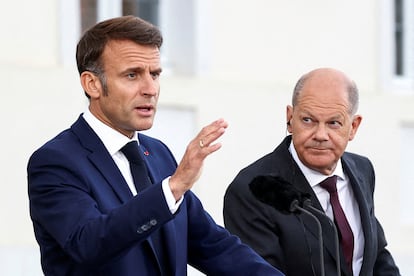Abandon all partisanship, ye Europeanists who enter here
The new post-election scenario makes European construction more complex. The pro-European parties must put aside their sectarian calculations and prioritize the common project instead

The European Union is facing existential challenges that will require an enormous effort in the coming years to adapt the common project to the turbulent contemporary scenario. The political balances that, according to the first projections, emerge from the European elections complicate an already arduous task. If the final results confirm the projections, the new term will be marked by two problematic factors for European construction: the surge by a heterogeneous galaxy of nationalist far-right forces; and the brutal blows suffered by the leaders in power in Berlin and Paris, the EU’s key driving forces. The EU’s center of gravity is shifting towards a Eurosceptic right, while its two largest national pillars are faltering.
Both are serious problems. None, however, is insurmountable.
In a pan-European approach, what the far-right vote means cannot be underestimated. There are differences, and very large ones, between the parties that fall under that category, but it is obvious that to a large extent it is a vote of rejection or skepticism towards the direction of European integration, of displeasure with the system. It is a serious matter, and it will be hard to reverse that dynamic. The solution is not to accept the theses defended their leaders, but to reduce the reasons for their voters’ unhappiness.
In any case, despite the far-right surge, according to projections, the traditional European coalition of popular, social democrats and liberals is retaining a majority in the European Parliament. The problem is that this majority appears to be too slim in view of the history of the groups, which do not usually vote compactly. Most of the time these deviations do not correspond to major dilemmas of principle, but to small partisan calculations. In any case, the Green group continues to exist as reinforcement that broadens the European base.
What is needed now is for the pro-European formations to abandon their petty partisan calculations and show some nobility of spirit to make mutual concessions, in the name of the greater interest of common construction. This calls on the EPP group not to seek alliances or flirt with the far right. And, to the others, to reciprocate by recognizing the latter’s electoral gains, taking steps back that do not cross red lines. There is room. Unlike so many poisoned national scenarios, polarized to the core, in Europe this is still possible. The bridges are not burnt. We just need to use them with a high level of vision.
As for the poor results obtained by the EU’s two great centers of national power, the blow is hard. The prospect of having two badly injured leaders in Germany and France is emerging as a new reality. What was already a not-very-flowing relationship shows signs of becoming even more complex due to the political desperation of both parties. The call for early legislative elections adds uncertainty to the mix. But again, the problem is not insurmountable. Le Pen is not in the Elysée, nor is Alternative for Germany in the chancellery. With the right will, there is room to reach agreements.
The diagnosis is clear: the EU is not well prepared for today’s world. It has a security and competitiveness deficit. It is too dependent, fragile, slow to react. Some believe that the answer is the Europe of nations, slowing or even reversing integration. Others believe that the solution is even more unity. The latter should end their partisanship and their short-term calculations and seek compromises with those who share this touchstone idea. They are the majority.
At the entrance of the European Parliament in this coming term someone should engrave an inscription: “Abandon all partisanship, ye Europeanists who enter here.” Otherwise, perhaps, in the not too distant future, there will be another inscription with the famous phrase by Dante: “Abandon all hope, ye who enter here.”
Sign up for our weekly newsletter to get more English-language news coverage from EL PAÍS USA Edition
Tu suscripción se está usando en otro dispositivo
¿Quieres añadir otro usuario a tu suscripción?
Si continúas leyendo en este dispositivo, no se podrá leer en el otro.
FlechaTu suscripción se está usando en otro dispositivo y solo puedes acceder a EL PAÍS desde un dispositivo a la vez.
Si quieres compartir tu cuenta, cambia tu suscripción a la modalidad Premium, así podrás añadir otro usuario. Cada uno accederá con su propia cuenta de email, lo que os permitirá personalizar vuestra experiencia en EL PAÍS.
¿Tienes una suscripción de empresa? Accede aquí para contratar más cuentas.
En el caso de no saber quién está usando tu cuenta, te recomendamos cambiar tu contraseña aquí.
Si decides continuar compartiendo tu cuenta, este mensaje se mostrará en tu dispositivo y en el de la otra persona que está usando tu cuenta de forma indefinida, afectando a tu experiencia de lectura. Puedes consultar aquí los términos y condiciones de la suscripción digital.









































